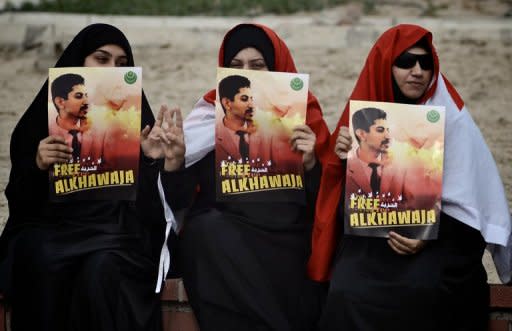Bahrain activist Khawaja to end 110-day hunger strike
Opposition activist Abdulhadi al-Khawaja, facing a life sentence on charges of seeking to overthrow Bahrain's Sunni rulers, announced Monday ending a 110-day hunger strike, as another rights campaigner is released on bail. Shiite Khawaja "will end his hunger strike this (Monday) evening," his lawyer Mohammed al-Jishi said. Earlier Jishi announced that prominent activist Nabeel Rajab was granted bail although he continues to face three separate trials on charges including writing tweets deemed insulting to the Bahraini government. In a statement posted by the lawyer on his Twitter page, Khawaja told his family he was ending his strike on Monday evening "despite failure to achieve the direct demand which is to be set free." But he would stop his fast "following the success of his supporters... in shedding light on the issue of detainees in Bahrain prisons... and taking in consideration the forced feeding imposed on him by authorities since April 23." Khawaja said he has "agreed to undergo a medical programme to return to a normal diet." Khawaja, who was arrested in April last year following a government crackdown on Shiite-dominated protests, began his hunger strike on February 8. The former head of the Bahrain Centre for Human Rights (BCHR), who has dual Bahraini and Danish nationalities, was convicted last June by a military tribunal, along with 20 other activists, of plotting to overthrow the government. Khawaja was among seven activists jailed for life, while 14 others were sentenced to between two and 15 years in prison. He is being retried in a civil court along with 12 others. A new hearing is slated for Tuesday. Last week he made his first court appearance since he began his hunger strike, arriving in a wheelchair, and announced that he was force-fed in prison. Rajab, also a Shiite and the current head of BCHR, was released on a bail of 300 dinars ($796) although he continues to face a travel ban, his lawyer said. Rajab was granted bail in the trial of posting tweets deemed insulting to security forces, over which he was arrested on May 5 upon arrival from a trip abroad. But the prosecutor ordered him to stay behind bars for questioning in the case of taking part in a rally and calling for illegal demonstrations. On Monday, the defence asked the court to "combine the three cases together in one trial," Jishi said. Rajab flashed the V for victory sign as he emerged from a police station in Manama, where relatives and supporters had gathered to celebrate his release. "I was arrested because of my rights activities," he said, vowing to continue to "defend the oppressed." Rajab had been leading anti-government protests following a brutal crackdown on Shiite-led demonstrations against the Sunni Al-Khalifa dynasty in March 2011. The avid tweeter is accused of insulting the security forces in tweets that he admitted came from his account on the microblogging website. On May 16, Rajab told the court the charge against him was "vindictive" as more than 50 lawyers turned up to defend him. Human Rights Watch earlier this month urged Bahraini authorities to drop charges against Rajab, saying they were an attempt to "silence one of the Bahraini government's most prominent critics." Bahrain came under strong criticism from international rights organisations over last year's mid-March crackdown on demonstrations that were inspired by the Arab Spring uprisings. An international panel commissioned by King Hamad to probe the government's clampdown found out that excessive force and torture were used against protesters and detainees. King Hamad promised reforms, including throughout the government's security bodies, while a number of policemen have been put on trial over torture. Amnesty International estimates that 60 people have been killed since protests broke out on February 14 last year.



